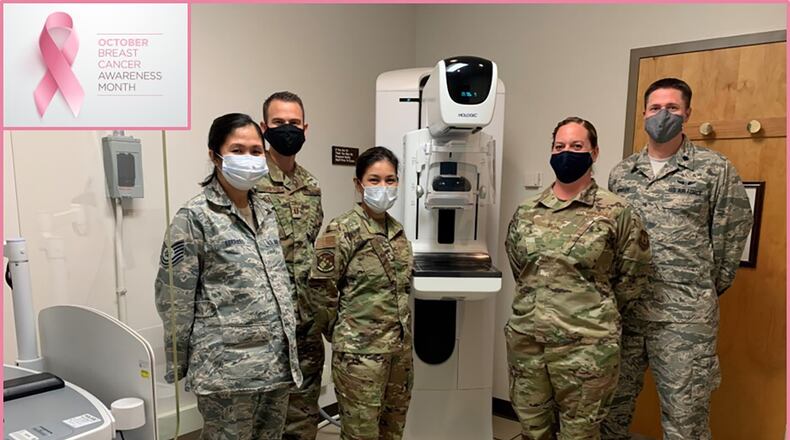Early detection of breast cancer is important as it is associated with an increased number of available treatment options, increased survival, and improved quality of life. While there is no definitive method of preventing breast cancer, early detection provides the best chance of effective treatment.
The beneficiaries of Wright-Patterson Medical Center have access to state-of-the-art technology when it comes to being assessed for breast cancer.
WPMC recently installed two new Hologic Selenia Dimensions 3D Mammography units. 3D mammography, otherwise known as breast tomosynthesis, acquires multiple low radiation dose images of each breast to create a 3D representation. This representation allows the radiologist to view the breast in layers, rather than a single plane, which accounts for better accuracy and sensitivity.
This new technology is being used at top medical institutions throughout the country and will aid in lessening the need for call back exams and breast biopsies. It will also help to detect cancers in earlier stages. In addition, these images are acquired with extremely low radiation doses, similar to conventional 2D mammography and well-below the Mammography Quality Standards Act recommendations for radiation exposure.
Now that both units have been installed, all patients are currently being scheduled on the new 3D machines. As a patient, you will notice virtually no difference between this exam compared to previous screenings with the exception of potentially added comfort thanks to paddle design changes made by the manufacturer.
All women should be familiar with the known benefits, limitations and potential risks linked to breast cancer screening. The American College of Radiology currently recommends annual mammographic screening beginning at age 40 for women of average risk. Higher-risk women should start mammographic screening earlier and may benefit from supplemental screening modalities.
It should be noted that various other national organizations, including the American Cancer Society and United States Preventative Task Force, have different recommendation guidelines for screening mammography, which patients should discuss with their primary care physician.
For women who have never had a mammogram, medical center staff will provide a positive experience. For many women, an annual mammogram can trigger anxiety or fear, but the importance of early detection in the fight against breast cancer is critical.
To schedule a screening mammogram, contact the WPMC mammography scheduling office at 937-257-2168.
About the Author
